
This Lent, as a collaborative community we are all invited to journey as followers fastened together by our faith in our Lord Jesus Christ. Our Lenten devotion of prayer will center around the seven last words (or phrases) of Jesus on the holiest day of the Christian year, using the book, “Seven Last Words for Seven Weeks: Praying with Jesus on the Cross” by Sr. Mary Sweeney, SC.
(Download a PDF of the book from our website here: Seven Last Words)
The program is designed to last the seven weeks of Lent, inviting participants to pray one Word (phrase) each week beginning with the week of Ash Wednesday. The Word for each week, along with thoughts and questions for your consideration, will be posted below.
Each day during the week:
- Try to set aside fifteen minutes. Find or create quiet space where you can pray. Spend some time just paying attention to your breathing and growing still. Then ask for the Holy Spirit to help you to pray.
- Recall the words of Jesus (for example: “I am thirsty.”) Try to be attentive to that scene in the gospel. You may want to be a compassionate observer or you may want to speak to Jesus.
- At the conclusion of your prayer time, express your gratitude for the time that you’ve had. If you find it helpful, jot down a word or a few words about your prayer/reflection.
- Carry the gospel word with you during the week. Call it to mind when you’re walking or running; showering or doing the dishes; ironing or standing in line; drinking a glass of water or feeling thirsty.
- The most important advice: Don’t get discouraged. Simply do the best you can. Some days you may be able to set aside fifteen minutes and feel blessed. Be thankful. Other days, it may be a struggle just to desire to pray. Don’t give up. Do what you can. Talk to God about your joy or your frustration in prayer. Ask for God’s help to set aside the time you need.
The Seven Last Words
- Sixth Week of Lent (Holy Week): The Seventh Word – “It is finished.”
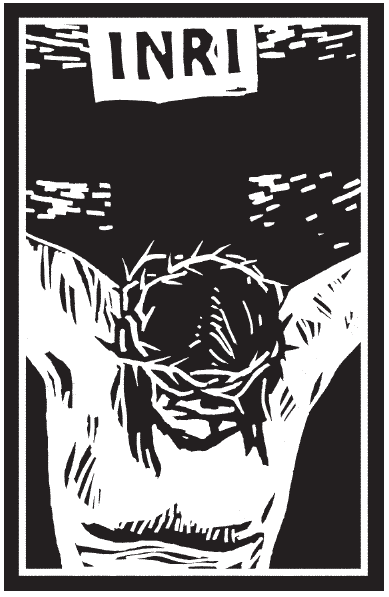
When Jesus had received the wine, he said, “It is finished.” Then he bowed his head and gave up his spirit.
John 19:30
Of all the seven last words, the words, “It is finished” sound more like words of self-reflection than any others. They are not like the interactive words spoken to Mary and John; neither are they like the reconciling words spoken to the repentant thief; nor, it seems, are they like the words of anguish and committal addressed to the Father. Instead, these words seem to be those of a man who, at the point of dying, looks back at his living to see it as a unified whole. He has come to do the will of the One who sent him.
Here are some thoughts and questions for your consideration this week:
- Can you look back on your life and see a pattern? Can you see how God’s will has been at work in it?
- Are there some specific aspects to your life that you can look back on and say, “It is finished,” and pray in thanksgiving?
- How does the example of the fidelity of Jesus touch you?
- Fifth Week of Lent: The Sixth Word – “Father, into your hands I commend my Spirit.”
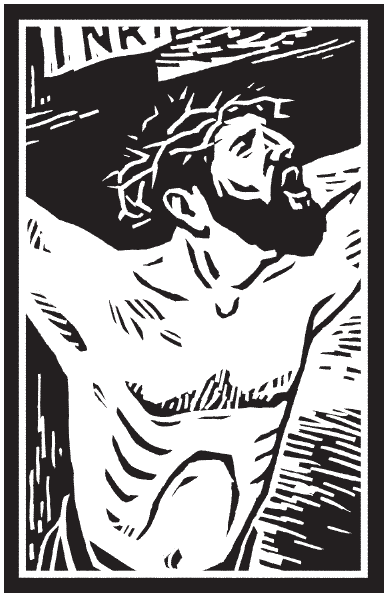
Then Jesus, crying out with a loud voice, said, “Father, into your hands I commend my Spirit.” Having said this, he breathed his last.
Luke 23: 46
Here are some thoughts and questions for your consideration this week:
- Try to set aside fifteen minutes.
- “Pick a time, pick a place, and then show up.” (Timothy Jones in Workaday Prayers)
- Reread the above gospel selection. Be attentive to the scene, imagining it, putting yourself at the foot of the cross. You may want to speak with Jesus.
- Be grateful for the Spirit’s gift: that you desire to pray.
- Recall the deep relationship Jesus had with his Father.
- Consider world events. Focus on one picture or one story that touches your heart and pray for those people, entrusting them to God’s care.
- Whenever you feel that life is beating you, you might find consolation in Psalm 31.
- Fourth Week of Lent: The Fifth Word – “Truly I tell you, today you will be with me in Paradise.”
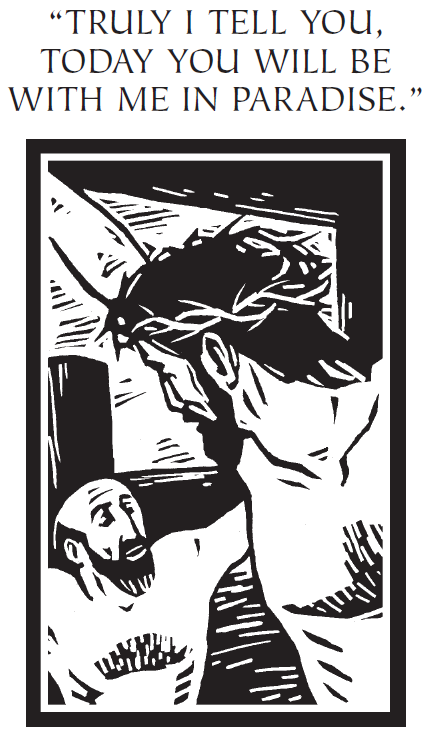
One of the criminals who were hanged there kept deriding him and saying, “Are you not the Messiah? Save yourself and us!”
But the other rebuked him, saying, “Do you not fear God, since you are under the same sentence of condemnation? And we indeed have been condemned justly, for we are getting what we deserve for our deeds, but this man has done nothing wrong.”
Then he said, “Jesus, remember me when you come into your kingdom.”
He replied, “Truly I tell you, today you will be with me in Paradise.”
Luke 23: 39-43
Here are some thoughts and questions for your consideration this week:
- Try to set aside fifteen minutes. Distractions in prayer are as normal and ordinary as they are in any relationship. Don’t get discouraged.
- Read the selection from Luke 23:39-43 above. Try to imagine that scene, putting yourself at the foot of the cross.
- Recall how your own attitude toward suffering or toward a difficult situation has either helped or hindered you.
- In the Hail Mary, we ask her to intercede for us “now and at the hour of our death.” Does that particular line hold much meaning for you?
- Reflect on the love that Jesus has for us, that love that invites us to be with him.
- At the outset of Lent, you had a particular desire as you begin this book; has that desire sharpened or changed during the ensuing weeks?
- Third Week of Lent: The Fourth Word – “My God, my God, why have you forsaken me?”

And about three o’clock Jesus cried with a loud voice, “Eli, Eli, lema sabachthani?” that is, “My God, my God, why have you forsaken me?”
Matthew 27:46
Seeing the suffering Jesus and hearing how he prayed helps us to pray our way through our own sufferings.
We realize again that he really entered into our human living and took on our heartaches and our pain.
Some questions to bring to prayer this week include:
- As you imagine this gospel scene, can you enter into conversation with Jesus about his suffering?
- Do you have your own experiences of feeling abandoned by God? How did/does it feel? How did/do you relate to God in those situations?
- Pray for those who feel abandoned: spouses and children who have been deserted, the mentally ill and homeless who are uncared for, those who cling to ideals when others have folded to pressure.
- Pray in gratitude for your faith- although it may seem weak at times- and for the faith of the community that sustains you in the midst of suffering.
- Second Week of Lent: The Third Word – “Woman, here is your son. Here is your mother.”
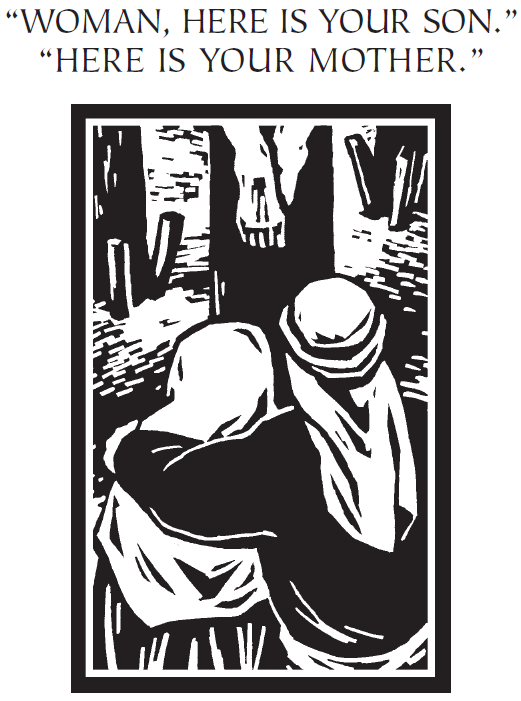
When Jesus saw his mother and the disciple whom he loved standing beside her, he said to his mother, “Woman, here is your son.” Then he said to the disciple, “Here is your mother.” And from that hour the disciple took her into his own home.
John 19:26,27
Of all of the phrases uttered by our dying Lord, there are none so tender as these spoken to his mother and to his beloved disciple. This gesture seemed so important to Jesus that it seemed as if it had loomed as the last piece of unfinished business of his earthly life.
Some questions to bring to prayer this week include:
- How might this scene help you to care for the people whom you love in your life?
- Do you feel free to ask others for help? Are there certain circumstances or certain people that make it easier or more difficult to ask?
- How does this gospel scene impress you as an adult child? How does it touch you as a parent? Watch the news, read the paper, and recognize the faces of other parents who suffer because of their children’s suffering. Pray for them.
- How do you relate to Mary, the mother of Jesus? What example of encouragement does her life offer you? Pray the Hail Mary thoughtfully.
- First Week of Lent: The Second Word – “Father forgive them; for they do not know what they are doing.”
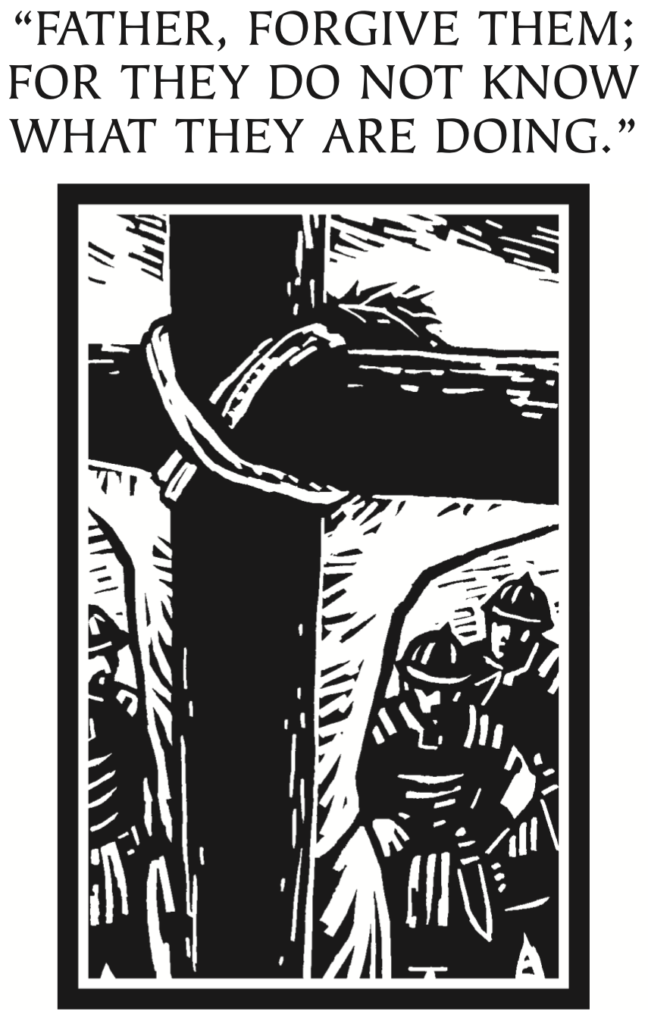
Then Jesus said,
“Father, forgive them; for they do not know what they are doing.”Luke 23:34
Can you recall a hurt that has taken hold of you, one that you can’t seem to let go?
Have you noticed how it can drain your energy and attention? How it can turn you into the sort of person that you really don’t want to be?
As you mediate on the words of Jesus this week, consider how he invites you to follow his example.
Here are some thoughts and questions for your consideration during this week:
- Imagine this gospel scene. Speak to Jesus about his forgiveness for those who have hurt him.
- How does this prayer of Jesus influence the way in which Jesus dies?
- Most days we find something impersonal or someone anonymous who offends or disturbs or annoys us: the person playing loud music, the driver who cuts us off or who fails to signal a turn, the inconsiderate stranger who does something that grates on us. Can we find in Jesus a way to forgive and to move on joyfully with our live?
- Within our closest relationships, with family members, friends, colleagues, community members, we often find the source of our deepest hurts. Infidelity, slander, disregard, abandonment, insensitivity – all may trigger our anger and our desire for revenge. In the suffering of Jesus, we find another approach. Who has offended you? For whom, with the help of God, do you want to pray?
- Recall the thirst, the desire that prompted you to commit yourself to prayer during Lent. Continue to express that desire to God.
- The Week of Ash Wednesday: The First Word – “I Am Thirsty.”
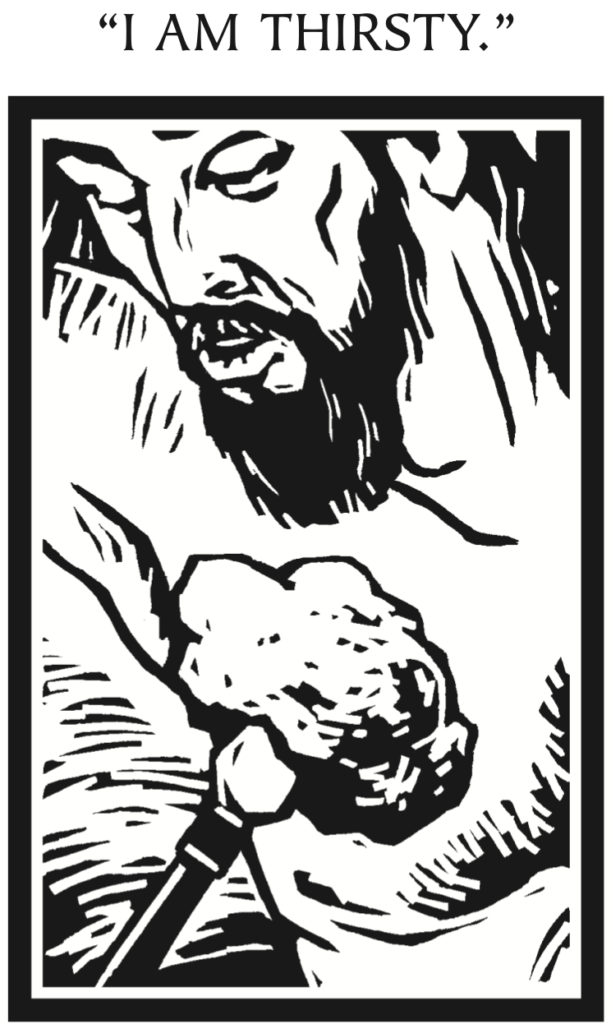
After this, when Jesus knew
that all was now finished, he said
(in order to fulfill the scripture),
“I am thirsty.”John 19:28
For what do you thirst?
Can you be attentive to the words of Jesus as they reveal your own thirst?
Here are some thoughts and questions for your consideration during this week:
- Recall your own experiences of thirst. How do they help you to relate to this scene of Jesus on the cross? In your prayer, express to him how you feel.
- Consider the people around the world who suffer because of the poor quality or the inadequate supply of water. Remember them to Jesus in prayer. Imagine the face of Jesus.
- For what do you thirst this Lenten season? Can you name it? Can you ask for it? How is Jesus the living water for you?
